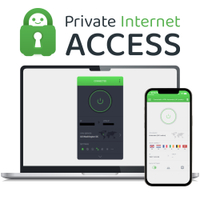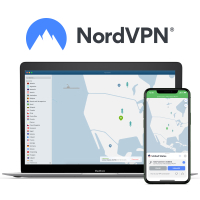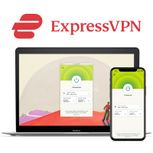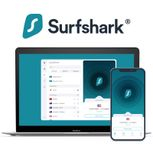Tom's Guide Verdict
PIA is a strong choice in all areas, with privacy at the forefront, demonstrated in court. There’s solid performance from this VPN, which, while not offering the fastest speeds or being quickest to introduce new technologies, offers great value for money for long-term subscribers, with plenty of features.
Pros
- +
Powerful and configurable apps
- +
Kill switch is reliable
- +
Unlimited devices on one plan
- +
Unblocked every streaming site we tested it with
- +
Great for torrenting
- +
No-logging audit
- +
Very powerful Android app
- +
Excellent value
Cons
- -
Had some issues with live chat support
- -
May be too complex for beginners
- -
Few extras beyond the VPN
- -
Below average speeds
Why you can trust Tom's Guide
Private Internet Access (PIA) was founded in 2010, making it one of the more established VPN providers available. It was acquired in 2019 by Kape Technologies who also now own ExpressVPN and CyberGhost VPN amongst other brands, and PIA is run out of Denver, Colorado.
PIA offers a comprehensive set of VPN features, with strengths in unblocking, privacy and torrenting, offering apps on just about all platforms, including a great Linux app and powerful Android app, which has recently been refreshed.
While most of the best VPNs claim that their interest is in your privacy, Private Internet Access has demonstrated this twice in court, where it had no personal details to hand over, as well as being audited by Deloitte to back up its privacy claims, which add to the reassurance customers can take from it.
PIA tends to stick to tried and tested technologies and hasn't introduced a huge amount of extra features outside the core VPN product, and it also isn’t the fastest VPN available in terms of speeds. However, it does offer a huge geographical spread of servers, and offers tons of customization for experts.
The cherry on top is that it’s good value for money, especially if you choose one of the longer plans, with advanced settings for those with particular demands, or a simple single button press for those who just want to protect their privacy online. If you’re looking for value for money, then PIA VPN is one of the best choices.
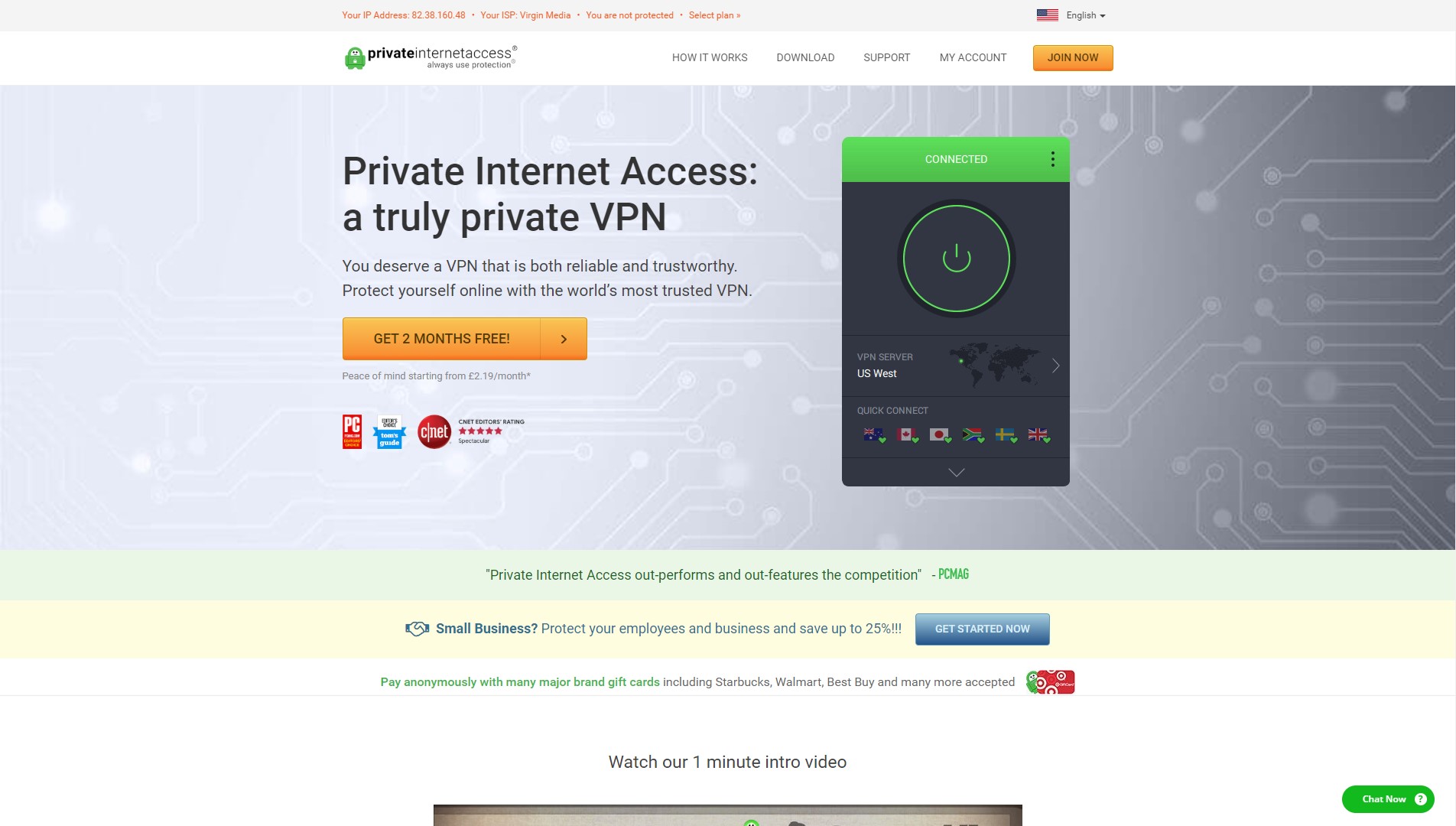
PIA on paper
| Number of servers | 10,000+ (including at least one in every US state) | Row 0 - Cell 2 |
| Server locations/countries | 151 / 91 | Row 1 - Cell 2 |
| Supported platforms | Windows, Mac, iOS, Android, Linux, Chrome, Firefox, Opera | Row 2 - Cell 2 |
| Simultaneous connections | Unlimited | Row 3 - Cell 2 |
| Split tunneling | Yes | Row 4 - Cell 2 |
| Kill switch | Yes | Row 5 - Cell 2 |
| Protocols supported | OpenVPN, IKEv2, WireGuard | Row 6 - Cell 2 |
| Country of registration | USA | Row 7 - Cell 2 |
| Support | Live chat, email, knowledgebase | Row 8 - Cell 2 |
If any of the VPN terminology is a mystery to you, then make sure you check out our glossary of VPN terms to keep you in the picture.
Latest updates
- Second Deloitte no logging audit complete
- Slight speed improvements in our testing
- Brand new Android app
- Apple TV app launched
- 3-monthly Transparency Reports
- MacOS split tunneling restored
Private Internet Access review: features
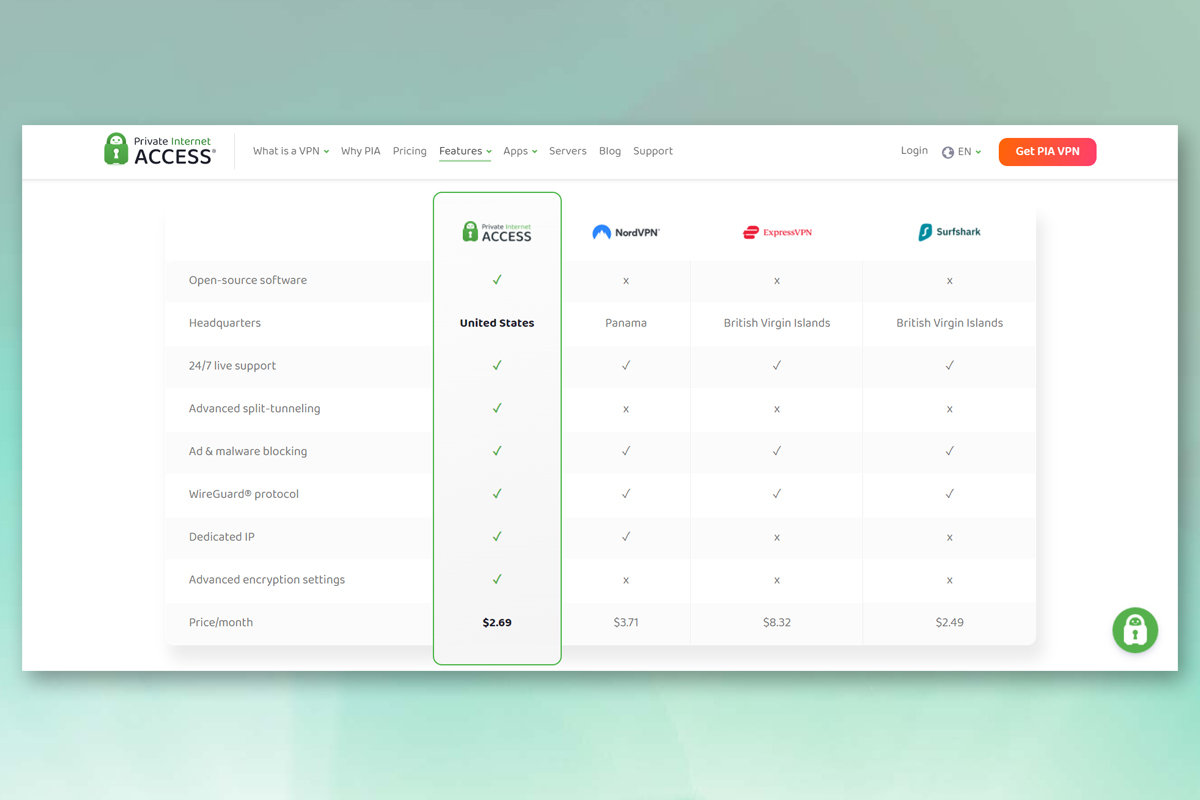
In a straight feature-for-feature comparison, Private Internet Access might come up short against some rivals, but the strength that PIA has is in offering core features that work well. That comes through in the wide range of apps that it has across most platforms, including desktop, mobile and TV platforms.
There’s great unblocking so you can get more out of your streaming services wherever you are in the world (with dedicated streaming servers too), as well as good support for torrenting and P2P sharing, including more advanced features like port forwarding from some servers.
One of the strengths of Private Internet Access is the server network. It has a greater number of individual servers compared to almost all its rivals – like ExpressVPN or NordVPN – and it has servers in every US state. Many of these are virtual (and PIA shows you which are physical and which are virtual in its apps), but that puts Private Internet Access in a strong point for those wanting to jump around US states.
Privacy is of course at the heart of a VPN and Private Internet Access has demonstrated its no-logging policy is legit in court more than once, while also having Deloitte audit the company to prove there’s no logging of user activity. There’s an effective kill switch should the VPN drop, so your data isn’t exposed.
That should give you peace of mind when using its services, with value for money being one of the strong points of PIA. There are more advanced options like the ability to set up a dedicated IP and split tunnelling to help you manage your VPN and make it work towards your needs. With management in mind, there’s also automation offered on mobile apps, so you can control exactly where it will connect when, for example, to use the PIA VPN on public networks, but not on your home network.
As a VPN, PIA is easy enough to get started with, but there are options for configuration that advanced users will appreciate. However, beyond that, other providers do offer more.
Rating: 7/10
Private Internet Access review: server network
Private Internet Access has a large number of servers with a wide geographical spread. Reportedly, the server fleet includes over 10,000 individual servers, although this is not claimed by PIA itself. More important is the wide range of locations 151 locations in 91 countries. This means there's plenty of spread – but not quite as wide as NordVPN (118 countries), ExpressVPN (105 countries) or Surfshark (100 countries).
One of the big things about PIA is that it has servers in all 50 US states – and no other provider comes close to that. The advantage this offers is that you can view local news or get medical information state-by-state, which isn’t possible through other providers. It might also get you access to particular sports coverage you can’t get out of state.
Otherwise, PIA has servers in most regions, with Asia being one of the weaker areas, compared to the likes of NordVPN or Proton VPN. Equally, PIA isn’t heavily invested in Africa, but there is still coverage in the continent.
Many of these locations are virtual and this is fully declared in PIA’s support documentation. A virtual server has the advantage of being able to avoid local legislation that could threaten PIA’s no logs policy, in which case the server will be located nearby. These can be identified through the app with a globe icon next to the country – for example, Andorra is a virtual server and many US states are virtual servers.
PIA also highlights those servers optimized for streaming – for example, in Canada, US (east and west coast), UK, Japan, Australia and a number of European countries. These are the servers that should work best for unblocking streaming from those locations.
9/10
Private Internet Access review: pricing (USD)
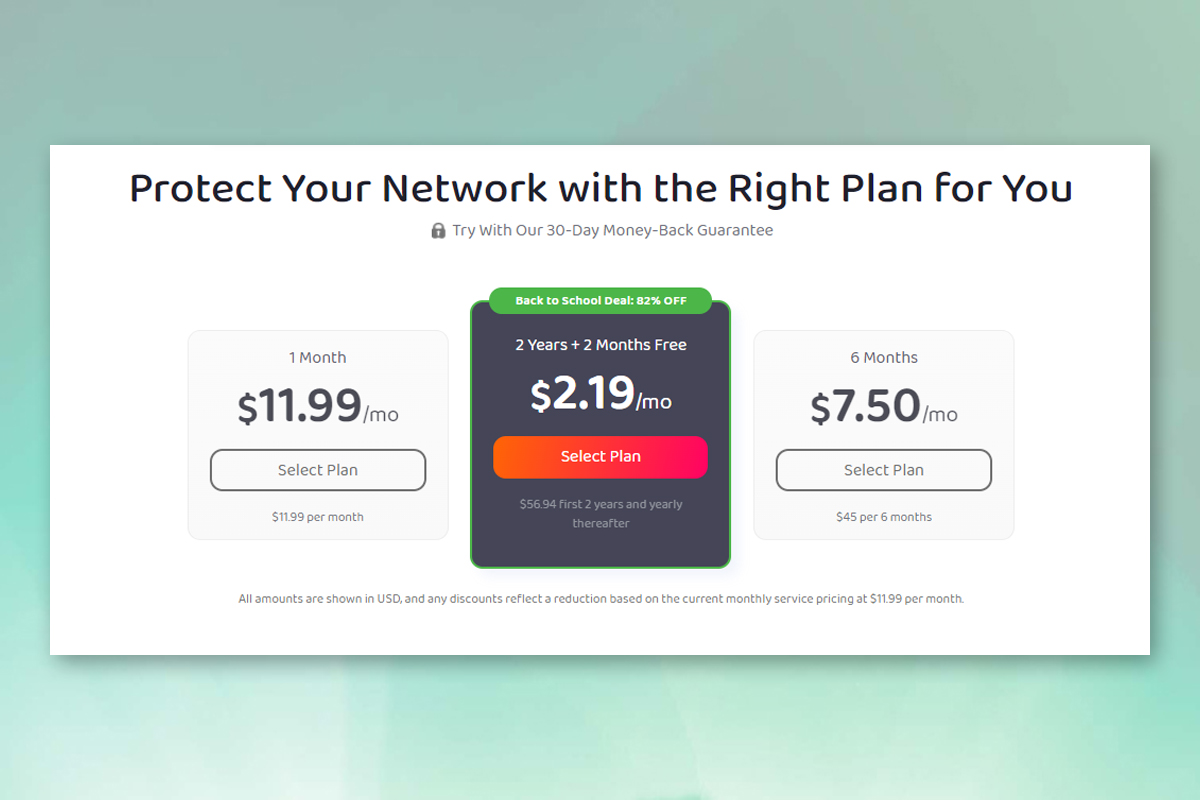
I’ve mentioned that Private Internet Access can represent good value for money, but that only applies to the longer plans, where you get terrific value. The monthly cost at $11.95 a month is pretty high and close to the price for ExpressVPN or NordVPN which are two of the best VPNs available, but once you dive into the longer-term plans, you can save serious amounts of money.
This might change the way you approach your VPN subscription, because you might think twice about paying that amount up front, but if you’re taking on a VPN subscription for long-term privacy protection, then it makes a lot of sense. There’s also a 30-day money-back guarantee, so if you don’t think it suits your requirements after paying, then you can get a refund.
| Plan length | Overall cost | Monthly cost |
| 1 month | $11.95 | $11.95 |
| 1 year | $39.95 | $3.33 |
| 3 years | $79.00 | $2.03 (varies) |
PIA offers plans at a number of different tiers, often throwing in free months on the longer plans too, so currently if you opt for 3 years, you get an additional 3 months included in the cost.
There are other offers available too, so if you fancy a 2-year subscription (with 2 months free) which works out to $2.19 a month, you can get that by clicking through on the Tom’s Guide offer link.
PIA also offers a dedicated IP option. Again, the price varies depending on the plan you choose, starting at $5 a month if you’re a on a monthly plan and dropping down should you take this option for longer.
9/10
Private Internet Access review: ease of use
Private Internet Access treads the line between being simple enough for beginners while offering options for more advanced users, with its apps offering a single big button to press to activate the VPN. One word of caution though: I found PIA’s “optimal” server to be in a different country which can immediately throw up complications like not being able to access local services as you normally would. It’s a quick fix to select the new server, however.
The good news is that apps are easy to access, so it’s a simple process to get up and running with PIA across your devices – and you’re not limited in the number of devices you can connect, either. That means you can protect your desktop, laptop, phone, tablet and other devices too, all from the same plan.
The desktop app chooses a compact form which can be a little fiddly as there’s a lot crammed in, but once you’re set up, hopefully you can just leave things as they are and hit that big button up at the top to get connected. You can also customize what you see in that compact view, so you have the details you want in front of you.
If you have any questions, then PIA’s knowledgebase has access to lots of information – and this is often elevated if you search for a particular question. Some parts of the VPN include definitions within the app, some you’re just expected to understand off the bat, which could deter those new to a VPN.
8/10
Private Internet Access review: apps
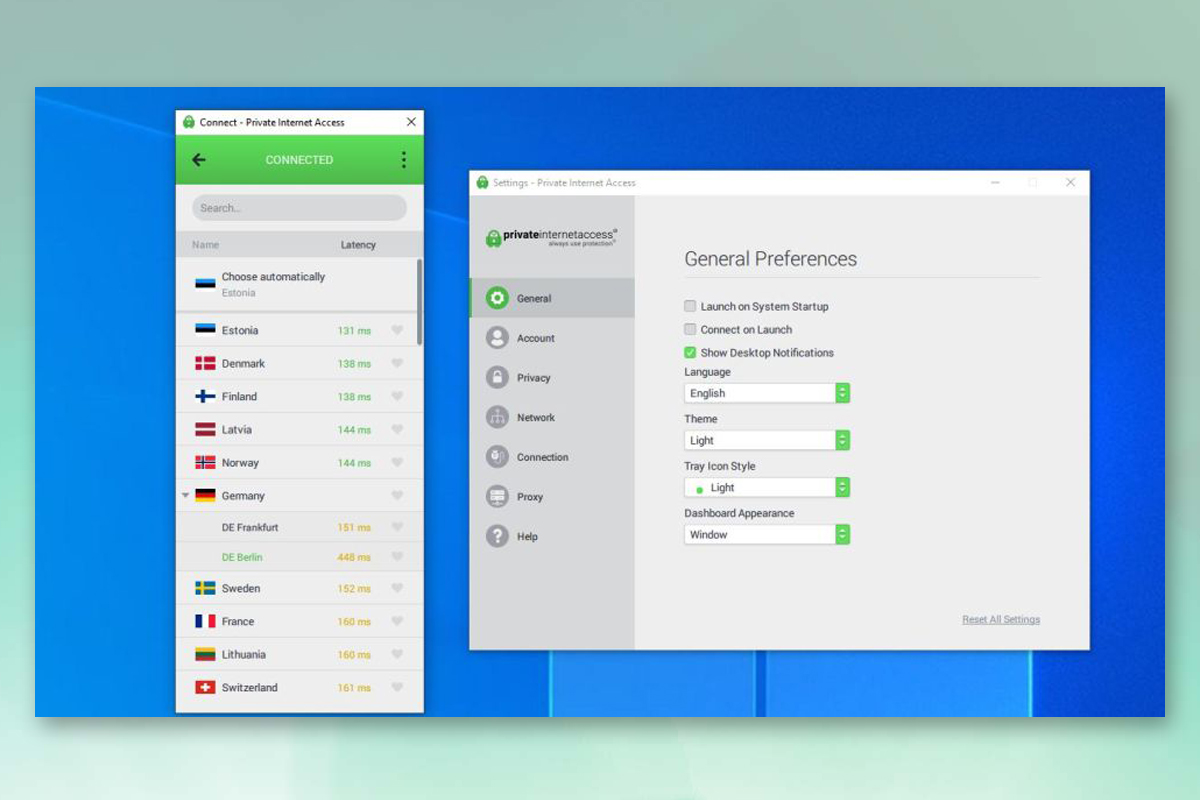
One of the best things about Private Internet Access is the wide range of apps that it offers. I’ve mentioned the Chrome extension which has the advantage of letting you change the location just for Chrome which can be really useful for online shopping, without running the VPN for your entire PC, for example.
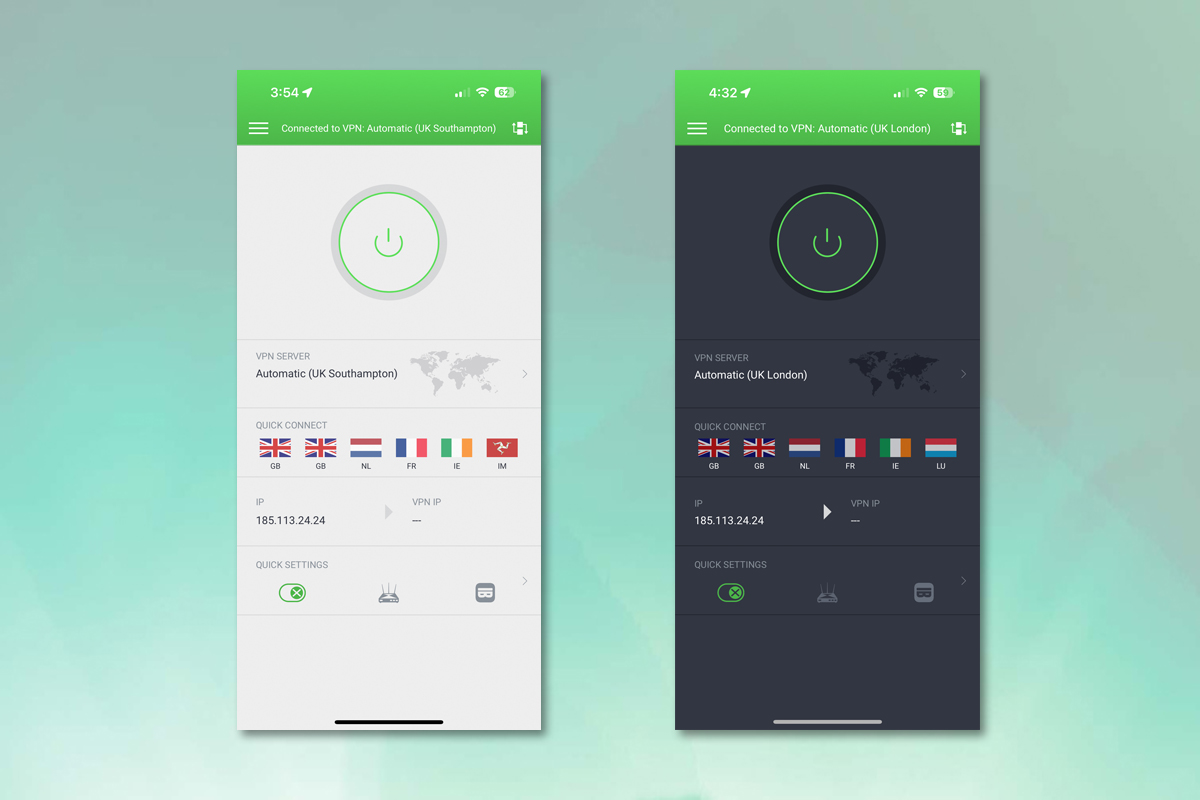
For TV devices, access to these apps means the opportunity to unblock streaming services so you can access content that’s not available in your region for example. For the Android-based devices, it’s really easy to just head to the Play Store and then install on your other devices from the drop-down list.
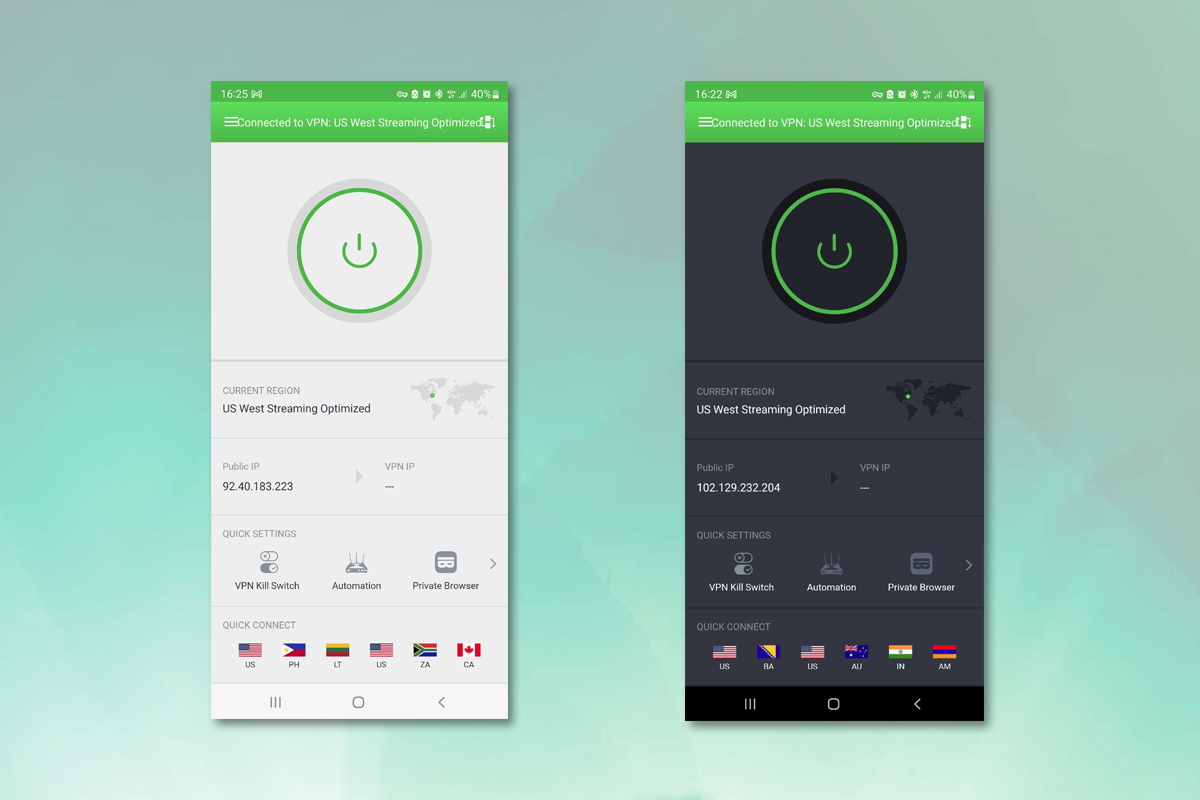
PIA mentions a number of other devices where it recommends using a VPN, such as on consoles. These don’t have dedicated apps, instead the recommendation is to configure your router for VPN use. Not everyone will be able to do this, especially if using a router from your internet service provider, but the advantage of having a VPN at router level is that everything connected to that network is then protected. This is where PIA’s split tunnelling feature could come in handy, as you might want to exclude things like banking apps that aren’t VPN friendly.
There’s no app for setting up PIA on your router and you’ll need to have a router that will allow that configuration. PIA provides documentation to walk you through the setup of the VPN on your router, but this is a more advanced setup and will likely deter the less tech savvy.
The Android VPN app has had an update recently, so it’s a much more comprehensive offering, including useful automation options which can control when PIA is used and when it isn’t. For example, you can exclude connections, like your home network or mobile connection, but choose to have PIA swing into place on any other Wi-Fi networks you join, which could be less scrupulous.
The apps have a similar interface too, so once you’re setup and running with one app, you’ll find it easy to work your way around the app on another platform.
9/10
Private Internet Access review: streaming and unblocking
Many people are interested in VPNs because of their ability to avoid regional restrictions for content. For example, some streaming services will only give you access to particular content in particular areas. For example, BBC iPlayer only works in the UK and if you head off on holiday, you’ll find you can’t access the service. Changing the location back to the UK using your VPN can solve this problem, meaning you can watch that Doctor Who Christmas Special when you’re away.
I tested access with a full range of streaming apps and found that they were all unblocked. As I mentioned before, there are optimized servers for streaming and the PIA VPN apps highlights these so you can choose a server just for streaming content.
This is a core tenet of a VPN for many users – especially if you’re interested in those apps for your Android TV or Fire TV – and as such PIA isn’t unique here. However, only the best streaming VPNs can match Private Internet Access's ability to unblock streaming sites.
PIA VPN is one of the better choices for torrenting. This is a popular file sharing method that allows you to share files with multiple people at once, or you can use it for P2P, for direct transfers of files between two users. The appeal of using a VPN is that it’s all encrypted so can’t be intercepted.
This is supported across all servers, so there are no restrictions in place, and there is a port forwarding function, although this isn’t supported by all servers, so if you want port forwarding make sure you’re on a supporting server first. Port forwarding can come with risks, so it’s really aimed at advanced users.
10/10
Private Internet Access review: connection speed
If you’re investing in a VPN subscription then you’ll want to know that it has the speed to deliver the content or services that you’re after. Speed will always be of interest to customers for a VPN service just as it is for an ISP. Ultimately your ISP will be what dictates your fastest speeds online, but you need to make sure that your VPN isn’t going to cause a frustrating bottleneck.
For most users, that won’t be a problem with PIA. We’ve tested speeds across all the VPNs we've reviewed, and although PIA isn’t the fastest, the peak download speeds of 436 Mbps we measured will be faster than many ISPs offer. If you’re lucky enough to have superfast broadband then you might want more speed, but for most users, PIA will be just fine.
Consider that Netflix only calls for 15 Mbps for 4K streaming and you’ve got plenty of scope for streaming multiple shows around your home at the same time. Of course, it’s not just about streaming and those wanting more speed might find that ExpressVPN or Surfshark (which we measured as the fastest VPN at 950 Mbps+ in our most recent tests), might be a better option.
We tested speeds in the morning and afternoon to see if there was any great difference, looking at both downloads and uploads, as well as latency and jitter, both using the nearest server and over a longer distances to get a measure of the overall performance. While download and upload speeds are commonly understood (it’s how broadband providers talk about their products afterall), latency and jitter are less talked about.
Latency is how long it takes for data to travel from one place to another (commonly called ping), while jitter is the variation in latency and can give an indication of the quality of the network. Thankfully, we found nice low latency and low jitter measurements, in line with other top-tier VPNs, so no concerns there – it’s just the speed that’s not quite up there with the best.
6/10
Private Internet Access review: privacy and security
VPNs are all about privacy and security – they are the reason they exist. A VPN’s core purpose is to encrypt your inbound and outbound data so that no one can intercept it and keep track of what you’re doing. It’s not just encrypted, it’s sent through a remote server, while your IP address is masked, so again, no one knows where the traffic is coming from.
PIA uses 128-bit AES or 256-bit AES encryption and if you want that higher level of encryption you’d have to select it manually. It uses the OpenVPN and WireGuard protocols, both well established and trusted standards. There’s also an effective kill switch that will disconnect you if the VPN drops to ensure that your data isn’t compromised because something happens on the VPN. We’ve tested these and found them to work, again providing another layer of protection.
Another thing I looked at was the tracking and cookies on PIA’s website, and there isn’t any, while those using the Android app will be asked to give up to 17 permissions, up from 15 last time we investigated. Many of these permissions are to get the app’s functions to work, so the number of permissions you actually grant will depend on the features you use.
PIA also has a no-logging policy. This is important, because what use is a remote server if that server’s recording what you do? PIA has been able to stand by this policy in two court cases, where the VPN had no data to hand over. That’s also been backed up by a second Deloitte data audit in April 2024, which again confirms that Private Internet Access isn’t logging user activity. The full audit is only available to PIA VPN subscribers, unfortunately, so those who want to read the details before paying for the service don’t get access to that information.
PIA also publishes a transparency report (which you can read here) so you can see when PIA has been called on to provide user information. This also details that there’s no data for them to hand over as nothing is stored. Again, this should be taken as a trust measure and give you confidence in PIA VPN’s privacy measures.
9/10
Private Internet Access review: history and the future
Private Internet Access has been around for quite a long time compared to some VPNs, and although it was acquired by Kape Technologies (which started out life with some advertising tech at the polar opposite end of the privacy scale), that doesn’t seem to have knocked PIA from its commitments.
For example, PIA has been summoned to disclose data about its users in court – and not once, but twice, there was nothing to hand over. That's the best proof of a watertight no-logs policy there is.
But the focus on demonstrating privacy doesn't stop there, and those transparency reports show that PIA doesn’t have the data to hand over when legally obliged to. The user reviews are positive too, with pretty consistent scores the mobile apps, as well as plenty of high-scoring reviews on Trustpilot.
In the future, I'd like to see Private Internet Access introduce more features. Fellow Kape-owned ExpressVPN spent the majority of 2024 catching up to rival NordVPN by developing a huge range of extras that come bundled in the basic plan. Could PIA do the same?
8/10
Private Internet Access review: customer support
If there’s one area that PIA could do better, it’s in customer support. While running tests on PIA, we did encounter a problem and elevated this to customer support where there was generally a lack of feedback about what was happening. That could be because it was a technical problem and to a certain extent, on a cheaper service like Private Internet Access, support might be one area where there are fewer resources.
However, there is extensive information online through the knowledge hub and I’ve found this pretty easy to get to. This runs from basic explainers through to more complicated guides for the technically minded. It’s great to have access to this material, because if you have a specific task you want PIA for, you’ll be able to find that information with a quick search. This also means you can search it up before you subscribe.
There is also a live chat feature where you’ll be able to get help, as well as the option to email in queries. The company says there is 24/7 support, but responses can be a little slow.
7/10
Private Internet Access review: final verdict
Private Internet Access | $2.19 per month | 24-month plan
Private Internet Access has appeal through the longer plans that it offers that bring the price down to a point where it’s almost unbeatable. If you’re looking for value, then PIA certainly offers it. That’s put in a position alongside a great unblocking and torrenting experience, apps across a full range of platforms and demonstrable no-log privacy policy.
Private Internet Access offers a host of features through its apps, from a single press button to quickly get protected, through to more advanced options for split tunnelling and port forwarding. While it’s good value for money, it doesn’t immediately have all the advanced features that you might find from big rivals, but don’t let that deter you – if you want affordable protection, then PIA VPN is a solid choice.
Final rating: 91.5/100
Subscribe if:
✅ You're a Linux user. PIA is an excellent VPN for Linux users, and is one of the few providers to offer a native GUI (Surfshark being another).
✅ You want proof of a no-logs policy. PIA has had its claim of no logging proven in court twice. That's just about as reliable proof as you're going to get.
✅ You want a server in every US state. This is perfect for getting around things like sporting blackouts and shopping restrictions, or doing research on medical procedures banned in your state.
Don't subscribe if:
❌ You prioritize connection speed. With peak speeds of around 330Mbps in our testing, PIA certainly isn't slow – but there are much faster out there.
❌ You value simplicity. PIA definitely presents as more of an 'expert' option, meaning that newbies could be intimidated by the additional functionality and settings.
Alternatives to Private Internet Access
NordVPN: the best VPN overall
From our testing, NordVPN has proven to be the best VPN overall, as it excels in just about every area. It doesn't offer quite as much customization as PIA, but it's faster, easier to use, and not a whole lot more expensive. Plans start at $2.99 per month, and there's a 30-day money-back guarantee.
ExpressVPN: the best VPN for beginners
ExpressVPN is one of PIA's biggest rivals, and if you're looking for VPN apps that are very simple and incredibly reliable, it's a better choice. It's great for streaming, its privacy credentials are all fully audited, and it's also a little better on mobile. However, with prices starting from $5.32 per month, it's also more expensive.
Surfshark: the best cheap VPN
If you're looking for a simpler VPN at a similar price to PIA, Surfshark is your best bet. It's tailored to be simple and effective, and with prices starting at $2.19 per month, it's awesome value.
How we test VPNs
Understanding how our team of experts tests VPNs is important. It lets you know that we really have got hands-on with these products, and that we’ve considered every feature, no matter how small. Some sites just give a rundown of specs found on a provider’s website – we endeavor to do quite a bit more than that.
First of all, we do check the provider websites, and note useful information like the number of servers and locations, whether you’re allowed to use every server for P2P, which encryption protocols are supported, the variety of operating systems it runs on, and tons more. We also check the pricing at this stage.
This initial scan gives us a baseline understanding of the service, and if there are any bold claims on-site we note them to make sure the customer isn’t being misled.
We’ll then dig into privacy policies. This is a very important piece of literature for any company, but for VPNs they need to be absolutely watertight. We’ll also go through the logging or zero-logging policy to look for gaps, and read any information available on independent audits.
Then it comes to testing the applications themselves. We test how easy it is to download and install, noting if any data collection options are clearly outlined to the user. We then inspect the default configuration to see what you have to ‘opt in’ for, and what features are available overall. We then play around with any additional features, such as ExpressVPN’s server speed test or NordVPN’s Double VPN. After we’ve gone through everything on the surface, the fun bit starts – trying to break things.
We throw all sorts of curveballs at these VPNs, like connecting to oddly configured networks, and killing processes to see if we can get the VPN to stop without activating the kill switch.
After we’ve had our fun, we check in with the support team to see if they’re helpful. Then, we’ll check a wide range of streaming sites to see if the VPN is able to access geo-blocked content, and we’ll run a series of speed tests over a few days and nights to get an accurate picture of what sort of connection speeds you can expect.
Disclaimer
We test and review VPN services in the context of legal recreational uses. For example: 1. Accessing a service from another country (subject to the terms and conditions of that service). 2. Protecting your online security and strengthening your online privacy when abroad. We do not support or condone the illegal or malicious use of VPN services. Consuming pirated content that is paid-for is neither endorsed nor approved by Future Publishing.

Chris has been writing about consumer tech for over 15 years. Formerly the Editor-in-Chief of Pocket-lint, he's covered just about every product launched, witnessed the birth of Android, the evolution of 5G, and the drive towards electric cars. You name it and Chris has written about it, driven it or reviewed it. Now working as a freelance technology expert, Chris' experience sees him covering all aspects of smartphones, smart homes and anything else connected. Chris has been published in titles as diverse as Computer Active and Autocar, and regularly appears on BBC News, BBC Radio, Sky, Monocle and Times Radio. He was once even on The Apprentice... but we don't talk about that.
- Mo Harber-LamondVPN Editor
-
episani I had a yearly subscription and by mistake they sent me an offer to reactivate that subscription which wasn't expired. I clicked and paid into the offer, which was for a 2 year subscription, but it created a new subscription instead of extending the existing one. I ended up with 2 subscriptions. I was expecting the subscriptions to be merged. When I received an email saying that my subscription was expiring it took me by surprise. When I contacted customer service they said I should have merged the subscriptions within 30 days of receiving the second subscription. They basically stole 7 months of subscription from me. Customer service is horrible and you can't access a history of financial dealings in your account. Please keep your emails as it is the only proof you have of any charges made by this company. Very dodgy. Please avoid.Reply -
rayh99 Been with PIA since 2010 and own multiple accounts that I pay with Gift cards. PIA stole $50 from me and have refused to restore or refund the funds even after providing them with statements showing that the payment was legit.Reply
Private Internet Access charged me $50 for a year account. A few days later they close my account and have refused to refund me the money or reinstated the account. The excuse they gave was that a transaction had show on the card that I paid with after purchasing the year service.
Even after I show a statement of the gift card that the PIA payment was the only one on the gift card pia refuses to refund or restore the account or refund the money.
I have heard multiple you tubers knocking them down since they got bought over but I actually never tough they will steal $50 and refuse to make things right. STAY AWAY FROM THIS VPN, THEY SCAMMED ME AND WILL DO YOU AS WELL. -
Cerelia I had the absolute worst experience with this company and would never use them nor recommend then again. I had a static IP address I paid for each month and it suddenly stopped working. I used the token I was given to try and reactivate it and received the error "incorrect token." I have numerous financial accounts linked to this IP address for access and was temporarily unable to access them.Reply
When I tried to resolve this with PIA, their chat support was absolutely abysmal . After explaining the issue, the person had no idea what the issue was and disappeared from the chat so long that it disconnected. When I tried to reinitiate the chat, it was busy for 2 hours. Finally I got through to the "same person" who acted like they had no idea who I was or what my issue was (amnesia?). They offered a refund with no explanation of why my static IP address stopped working.
Email support was even worse. It was like talking to machines who don't read or understand tickets. How can anyone use a company that offers static IPs then randomly has them stop working...... Absolutely terrible all around. -
3ch Deceitful. Servers in 50 states either is false, or is irrelevant for the user.Reply
Fifteen US servers are listed in the UI, TWELVE of which are recognizable by a state name or a city name.
Disingenuous in replies to my complaints about the reduction in number from
the former far from 50
to the current 12. -
New User 101 I wonder if the reviewer Mo Harber-Lamond, ever actually used the PIA VPN, or did he just read about it somewhere else? If he had used it, even once, he would know that PIA is blocked by Google and a vast number of websites. It is almost impossible to run a basic anonymous search using google, without running against an almost infinite number of CAPTCHA tests.Reply
I suppose it is possible to avoid the test by logging into Google but users with any sense of personal security are outraged by the prospect of Goggle using your search terms to create a marketing profile. As far as I know, PIA never refreshes it's IP address ranges, so once the address is logged by the Google server, it is almost impossible to avoid being tracked. All the other search engines, DDG, Bing, Yahoo, Yandex, etc, are rubbish.
When my PIA contract expires, I will not be renewing and will apply other methods to search the internet, quietly. -
keepitsimpleengineer I recommended this to my brother who travels a lot. He could not get into his account to set it up. I advised him to cancel his credit card payment, Seemingly VPN company competition to drive down prices has resulted in terrible customer support, which is a shame.Reply -
Barneshta 30 days money back guarantee is a lie and a scam. They dont offer port forwarding like they advertised, so I immidiatelly deinstalled it and asked for my money back. Customer service first tried to play out me with requesting various codes, transaction codes and similar. After I have provided them all of the codes, transactions they just stopped responding to my emails. I tried several times to reach them, but no success, they just stole my money.Reply

